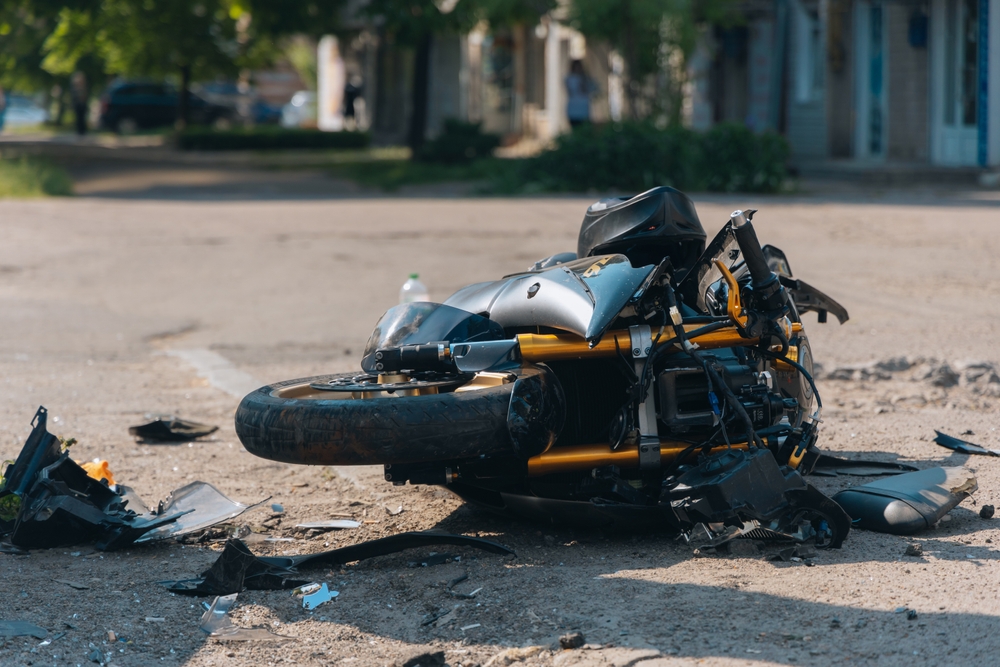The most important things to do after a motorcycle accident are to ensure your immediate safety, seek a thorough medical evaluation, and carefully document everything that happened. Because motorcyclists have less protection than those in cars or trucks, the injuries sustained can be severe, sometimes even life-altering. Knowing what steps to take immediately afterward and in the days that follow can make a world of difference. Consulting a motorcycle accident lawyer early in the process helps ensure you receive the medical care you need and protects your right to seek fair compensation.
p style="text-align: center;">Schedule a Free ConsultationKey Takeaways for What to Do After a Motorcycle Accident
- A person's first priority following a motorcycle crash should be their health and safety, followed by reporting the incident to the police.
- Collecting detailed evidence at the scene, including photographs and witness information, is fundamental for any future claims.
- Avoiding common mistakes, such as giving premature statements to insurers or posting on social media, is crucial for protecting a claim.
- Texas law, including the at-fault system and the 51% comparative fault rule, significantly influences how compensation is determined.
- A full understanding of potential damages, including medical costs, lost income, and pain and suffering, is necessary to pursue a fair recovery.
- Strict deadlines, known as statutes of limitations, apply to filing personal injury lawsuits in Texas.
First Response: Critical Actions at the Scene

The moments following a motorcycle accident are often chaotic, but the actions you take can have a lasting impact. Once you’ve assessed your immediate safety and called for help, your focus should shift to preserving crucial information that will be vital later.
Prioritize Safety and Call 911
Your well-being is the top priority. Before doing anything else, check yourself and others for injuries.
- Move to a safe location away from traffic if you are able to do so without risking further injury. Leave your motorcycle where it is unless it poses an immediate hazard.
- Call 911 immediately. This summons both medical assistance and law enforcement to the scene. An official police report is an essential piece of documentation.
- Accept medical attention from paramedics, even if you feel fine. Adrenaline can mask pain, and some serious injuries, like concussions or internal bleeding, aren't immediately obvious.
Having an official report from the Abilene Police Department or the Taylor County Sheriff's office creates an objective record of the incident, which is invaluable for your claim.
Document Everything You Can
Your smartphone is a powerful tool for gathering evidence. If you are physically able, use it to capture a comprehensive record of the scene.
- Take numerous photos and videos from multiple angles. Document damage to your motorcycle and the other vehicle(s), skid marks, road conditions, traffic signs, and any visible injuries you have sustained.
- Exchange information with the other driver. Get their full name, address, phone number, driver's license number, and insurance policy details. Take a picture of these documents if possible.
- Speak to any witnesses. Politely ask for their names and contact information. An independent account of the accident can be incredibly persuasive.
This initial evidence-gathering phase lays the groundwork for establishing how the accident happened and who was responsible.
The Next 48 Hours: Protecting Your Health and Your Claim
Once you have left the scene and are back home, the focus shifts to your medical recovery and initiating the formal claims process. The steps you take during this period are just as critical as those you took at the scene.
Seek a Full Medical Examination
Even if paramedics checked you at the scene, a follow-up visit with a doctor or an urgent care clinic is essential.
- Schedule a comprehensive medical evaluation as soon as possible. A doctor can identify and begin treating injuries that may have been missed initially.
- Clearly explain to the doctor that your injuries are from a motorcycle accident. This helps create a direct link between the collision and your medical condition in your official records.
- Follow your doctor's treatment plan precisely. Attend all follow-up appointments, take prescribed medications, and participate in any recommended physical therapy.
Consistent medical care not only promotes your recovery but also generates the official documentation needed to prove the extent of your injuries and damages.
Report the Accident to Your Insurance Company
You are required by your own policy to notify your insurance provider about the accident in a timely manner.
- Contact your insurance agent to report the crash. Provide them with the basic facts: the date, time, location, and the other driver's information.
- Stick to the facts and avoid speculation. Do not guess about what caused the crash or admit any level of fault.
- Be aware that you are not obligated to speak with the other driver's insurance adjuster right away. It is often wise to seek guidance before providing them with a recorded statement.
This initial report gets the process started, but it's important to be cautious in all communications with insurance representatives.
Common Pitfalls to Avoid After a Motorcycle Wreck
Several potential missteps can jeopardize your claim. Being aware of these common pitfalls can help you protect your right to fair compensation.
Giving a Recorded Statement Prematurely
The other driver's insurance adjuster will likely contact you quickly and ask for a recorded statement about the accident.
- You are not required to provide a recorded statement to the opposing insurance company. These statements are often used to find inconsistencies or ways to assign blame to you.
- Politely decline their request until you have had a chance to understand your rights. Anything you say can be taken out of context and used against you later.
- An adjuster's job is to minimize the amount their company has to pay. They are not on your side, and their questions are designed to benefit their position, not yours.
Protecting your claim means being very careful about what you say and to whom you say it.
Accepting the First Settlement Offer
Insurance companies often try to resolve claims quickly by offering a low, lump-sum settlement.
- Never accept a first settlement offer until you know the full extent of your injuries and financial losses. Initial offers rarely account for future medical needs, ongoing lost wages, or long-term pain and suffering.
- Remember that once you accept a settlement, you forfeit your right to seek further compensation. If your injuries worsen or new complications arise, you cannot reopen the claim.
- Take time to evaluate the true value of your claim. This includes all current and future medical bills, lost income, property damage, and the non-economic impact on your life.
A quick payout may seem appealing, but it's crucial to ensure it fairly covers all your damages before signing anything.
Posting About the Accident on Social Media
In today's digital age, it's natural to want to share life updates online, but after an accident, this can be detrimental to your case.
- Refrain from posting any details, photos, or opinions about the accident online. Insurance companies and opposing lawyers will search your social media profiles for evidence they can use.
- Even seemingly innocent posts can be misconstrued. A photo of you out with friends could be used to argue that your injuries are not as severe as you claim.
- Set your profiles to private and ask friends and family not to post about your accident or recovery. The best policy is to stay off social media entirely until your claim is resolved.
Maintaining your privacy during this time is a simple but effective way to protect the integrity of your personal injury claim.
Understanding Texas Law and Your Motorcycle Accident Claim
The legal framework in Texas plays a significant role in how motorcycle accident claims are handled. Key principles like the at-fault system and comparative negligence rules will directly impact the outcome of your case.
Texas is an "At-Fault" State
Texas law follows an "at-fault" or "tort-based" system for auto accidents, which means the person who caused the crash is financially responsible for the resulting damages.
- The at-fault driver's liability insurance is the primary source of compensation. Your claim will be filed against their policy to cover your medical bills, lost wages, and other losses.
- Proving fault is the cornerstone of your claim. This is why gathering evidence like police reports, witness statements, and photos is so critical.
- If the other driver is uninsured or underinsured, you may need to turn to your own Uninsured/Underinsured Motorist (UM/UIM) coverage.
This system makes establishing clear liability a necessary first step in securing compensation.
The "51% Bar Rule" of Comparative Negligence
In many accidents, the insurance company will try to argue that the motorcyclist shared some of the blame. Texas law addresses this through a system called "modified comparative fault."
- Under this rule, you can still recover damages as long as you are not found to be 51% or more at fault for the accident.
- Your total compensation will be reduced by your percentage of fault. For example, if you are deemed 10% responsible for the crash and have $100,000 in damages, your award would be reduced by 10% to $90,000.
- If you are found 51% or more responsible, you are barred from recovering any compensation at all.
Because of this rule, fighting against any unfair allocation of blame is essential to protecting your financial recovery.
Pursuing Fair Compensation for Your Losses
A successful motorcycle accident claim aims to make you "whole" again by providing financial compensation for all the ways the accident has impacted your life. These damages are typically categorized as economic and non-economic.
Economic Damages
These are the direct, calculable financial losses you have incurred as a result of the accident.
- Medical Expenses: This includes everything from the initial ambulance ride and emergency room visit to surgeries, hospital stays, physical therapy, prescription medications, and any anticipated future medical care.
- Lost Wages and Earning Capacity: You can be compensated for the income you lost while unable to work. If your injuries prevent you from returning to your previous job or limit your future earning potential, this can also be included.
- Property Damage: This covers the cost to repair or replace your motorcycle, helmet, riding gear, and any other personal property damaged in the crash.
Keeping meticulous records of every bill, receipt, and pay stub is crucial for accurately calculating these damages.
Non-Economic Damages
These damages are more subjective and compensate you for the intangible, personal losses you have suffered.
- Pain and Suffering: This accounts for the physical pain, discomfort, and emotional distress caused by your injuries and the recovery process.
- Mental Anguish: This can include compensation for conditions like anxiety, depression, fear, or post-traumatic stress disorder (PTSD) stemming from the traumatic event.
- Loss of Enjoyment of Life: If your injuries prevent you from participating in hobbies, activities, or aspects of daily life that you previously enjoyed, you may be compensated for this loss.
While these losses don't have a clear price tag, they are a very real and significant part of the harm you've endured, and a legal professional can help articulate their value. Understanding how much a personal injury lawyer costs can also help you plan your next steps confidently.
Should your case proceed to a lawsuit, it would be filed and heard at a location like the Taylor County Courthouse.
FAQs: What to Do After a Motorcycle Accident?
Below are answers to some frequently asked questions about steps to take after a motorcycle accident.
If the other driver leaves the scene, you should report it to the police immediately with as much detail as you can remember about the vehicle. In this situation, your own Uninsured Motorist (UM) coverage would likely be the primary source for your claim. It is crucial to have this coverage, as it protects you from the irresponsible actions of others.
Your insurance company (or the at-fault driver's) will have an adjuster assess the damage to your motorcycle. They will determine if it is repairable or if it is a "total loss." If it's repairable, they will cover the cost of repairs. If it's totaled, they should offer you the Actual Cash Value (ACV) of the motorcycle, which is what it was worth right before the crash. You can negotiate this amount if you believe their offer is too low.
While it is possible to handle a claim on your own, especially for very minor accidents with no injuries, it is often not advisable for any crash involving physical harm. Insurance companies have teams of adjusters and lawyers working to protect their interests. Having a knowledgeable advocate on your side helps level the playing field and ensures you are not taken advantage of during a vulnerable time.
Let Us Help You on the Road to Recovery

At the Law Offices of David M. White, we believe that helping people is what we're all about. We understand that a motorcycle accident can turn your life upside down, and we are committed to providing the compassionate and dedicated representation you need during this difficult time. Our team will work hard to obtain a great result for your case while making the legal process as stress-free as possible for you and your family.
If you have been injured in a motorcycle crash in Abilene, San Angelo, or the surrounding communities, our personal injury lawyers are here to help. We can handle the communications with insurance companies, investigate your accident, and fight for the full and fair compensation you deserve.
For a free and confidential consultation to discuss your case, contact the Law Offices of David M. White today at (325) 437-3311 or through our online form. Let us take on the legal burdens so you can focus on what matters most: your healing and recovery.
p style="text-align: center;">Schedule a Free Consultation